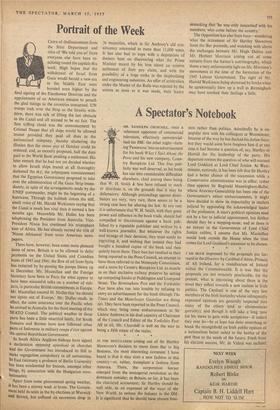IN THE SPECULATION arising out of Sir Hartley Shawcross's decision
to move from Bar to Big Business, the most interesting comment I have heard is that it may start a new fashion in this country—or, rather, transplant a fashion from America. There, the corporation lawyer emerged from the managerial revolution as the dominant outsider; in Britain, so far, it has been the chartered accountant; Sir Hartley should be well able, as an exponent of the ways of the New World, to redress the balance in the Old. It is significant that he should have chosen busi- ness rather than politics. Admittedly he is un- popular now with his colleagues at Westminster, because of the way he has ducked his duties there; but they would soon have forgiven him if at any time it had become a questian of, say, Hartley or Harold for the leadership of the party. His departure revives the question of who will succeed Lord Goddard as Lord Chief Justice. At West- minster, curiously, it has been felt that Sir Hartley had a better chance of the succession while a Conservative administration was in office; rather than appoint Sir Reginald Manningham-Buller, whose Attorney-Generalship has been one of the Government's minor embarrassments, it might have decided to show its impartiality in matters judicial by appointing the acknowledged leader of the profession. A man's political opinions need not be a bar to judicial appointment, but neither should they be a stepping-stone; and as there is no lawyer in the Government of Lord Chief Justice calibre, I assume that Mr. Macmillan would look outside the House when the time comes for Lord Goddard's successor to be chosen.


































 Previous page
Previous page